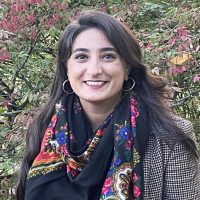
Gülay Kilicaslan
Assistant Professor
| Degrees: | B.Sc. (Middle East Technical University), M.A. (Bogazici University), Ph.D. (York University) |
| Phone: | (613) 520-2600 x 2591 |
| Email: | gulay.kilicaslan@carleton.ca |
| Office: | D598 Loeb |
Having a multidisciplinary academic background in political science, public administration, international relations, and sociology, I am committed to fostering interdisciplinary dialogues between and across critical socio-legal studies, forced migration studies, social movement studies, feminist and gender studies, and digital culture studies in my scholarship. More specifically, my research interests lie at the intersection of (1) critical forced migration studies, (2) refugee law and politics of citizenship and resettlement, (3) nation-state and border violence, (4) resistance and social movements in the Global South (particularly in the Middle East), and (5) digital activism and culture.
The first of my two ongoing projects is completing a book manuscript, tentatively titled Deprovincializing Kurdish Politics: Forced Migration and Activism Across Kurdistan, Turkey and Europe. Based on my Ph.D. research and dissertation, which received York University 2022 Sociology Distinguished Dissertation Award, the book looks at the impacts of the forced displacement of Kurds on the dynamics of Kurdish political mobilization in Northern Kurdistan, Turkey and Europe. My second project comparatively explores the resettlement experiences of Yezidi genocide survivors and their mobilization strategies in Germany and Canada.
My writings on Kurdish forced migrants, the Kurdish freedom movement, migrant agency, decolonial feminisms, gender-based online violence and digital feminist activism have appeared in scholarly edited books and journals. My scholarship reflects my commitment to community-engaged and interdisciplinary approaches to research and teaching with an emphasis on social justice. I find great interest in collaborating with and supervising undergraduate and graduate students, and welcome requests for supervision from those with overlapping research interests.